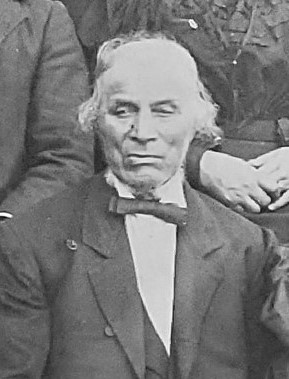Basil Biggs
Basil Biggs (1820–1906) was an African American farmer, veterinarian, and laborer who played a significant role in the aftermath of the Battle of Gettysburg during the American Civil War. He is best known for his work in the reburial of Union soldiers at the Gettysburg National Cemetery.
Early Life[edit | edit source]
Basil Biggs was born in 1820 in Maryland. He was born into slavery but gained his freedom before the Civil War. He moved to Gettysburg, Pennsylvania in the 1850s, where he worked as a farmer and veterinarian.
Role in the Battle of Gettysburg[edit | edit source]
During the Battle of Gettysburg in July 1863, Biggs and his family fled their home to avoid the conflict. After the battle, the town of Gettysburg was left with thousands of dead soldiers. Biggs was contracted by the federal government to exhume the bodies of Union soldiers from temporary graves and rebury them in the newly established Gettysburg National Cemetery.
Post-War Life[edit | edit source]
After the war, Biggs continued to live in Gettysburg, where he became a respected member of the community. He was involved in various civic activities and continued his work as a veterinarian and farmer. Biggs was also active in the local African Methodist Episcopal Church.
Death and Legacy[edit | edit source]
Basil Biggs died in 1906 and was buried in the Lincoln Cemetery in Gettysburg. His contributions to the Gettysburg community and his role in the reburial of Union soldiers have been recognized as significant acts of service during a tumultuous time in American history.
Related Pages[edit | edit source]
- Battle of Gettysburg
- Gettysburg National Cemetery
- American Civil War
- African Methodist Episcopal Church
Search WikiMD
Ad.Tired of being Overweight? Try W8MD's physician weight loss program.
Semaglutide (Ozempic / Wegovy and Tirzepatide (Mounjaro / Zepbound) available.
Advertise on WikiMD
|
WikiMD's Wellness Encyclopedia |
| Let Food Be Thy Medicine Medicine Thy Food - Hippocrates |
Translate this page: - East Asian
中文,
日本,
한국어,
South Asian
हिन्दी,
தமிழ்,
తెలుగు,
Urdu,
ಕನ್ನಡ,
Southeast Asian
Indonesian,
Vietnamese,
Thai,
မြန်မာဘာသာ,
বাংলা
European
español,
Deutsch,
français,
Greek,
português do Brasil,
polski,
română,
русский,
Nederlands,
norsk,
svenska,
suomi,
Italian
Middle Eastern & African
عربى,
Turkish,
Persian,
Hebrew,
Afrikaans,
isiZulu,
Kiswahili,
Other
Bulgarian,
Hungarian,
Czech,
Swedish,
മലയാളം,
मराठी,
ਪੰਜਾਬੀ,
ગુજરાતી,
Portuguese,
Ukrainian
Medical Disclaimer: WikiMD is not a substitute for professional medical advice. The information on WikiMD is provided as an information resource only, may be incorrect, outdated or misleading, and is not to be used or relied on for any diagnostic or treatment purposes. Please consult your health care provider before making any healthcare decisions or for guidance about a specific medical condition. WikiMD expressly disclaims responsibility, and shall have no liability, for any damages, loss, injury, or liability whatsoever suffered as a result of your reliance on the information contained in this site. By visiting this site you agree to the foregoing terms and conditions, which may from time to time be changed or supplemented by WikiMD. If you do not agree to the foregoing terms and conditions, you should not enter or use this site. See full disclaimer.
Credits:Most images are courtesy of Wikimedia commons, and templates Wikipedia, licensed under CC BY SA or similar.
Contributors: Prab R. Tumpati, MD

